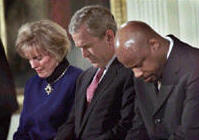
|
|
|
|
Slouching Toward Theocracy |
|
He told the audience that since he had been unable to garner congressional support for his faith-based initiative, he issued executive orders; recently putting the finishing touches on regulations instructing all federal agencies not to discriminate against religious groups. This particular executive order resulted in freeing-up $3.7 billion in federal funds that will be dispersed primarily through the Justice Department to faith-based organizations. Last week marked the third anniversary of the president's creation of the White House Office of Faith-Based and Community Initiatives (OFBCI). Over the past three years, executive orders were issued, Centers for Faith-Based and Community Initiatives were established at seven federal agencies, web sites were created, technical assistance to religious organizations was given at seminars and conferences, guide books helping religious groups apply for government funds were published, and billions were earmarked for faith-based institutions. It hasn't been all smooth-sailing for Team Bush. Conservatives and liberals initially opposed the president's initiative; many conservatives eventually got on board, while liberals continue to object to what they characterize as violations of the separation of church and state, and the potential for discriminatory hiring practices by many religious organizations fundamentally opposed to hiring gays and lesbians. John DiIulio, the longtime criminologist and political scientist hired to run the OFBCI, resigned after only six months on the job and later was the subject of an Esquire magazine interview highly critical of the administration. A major crisis developed when the Washington Post revealed that top administration officials had tried to solicit support from the Salvation Army by offering a firm commitment that any legislation would allow religious organizations to sidestep state and local anti-discrimination measures barring discriminatory hiring practices on the basis of sexual orientation. And Congress still hasn't developed a comprehensive faith-based legislative package. On balance, however, the administration has achieved much more than people think. A White House-issued Press Release dated January 15, proudly pointed to 7 "Milestones" in the life of the president's faith-based initiative - from its launch in January 2001 through this month's $3.7 billion executive order. As originally conceived, Bush's faith-based initiative was to be the centerpiece of his administration's domestic agenda, spearheading the final attack on the New Deal and the War on Poverty, transferring a host of government programs from government agencies to the religious sector.
During his 2003 State of the Union address the president proposed an initiative aimed at mentoring children whose parents are in prison, along with a $600 million program "to help addicted Americans find needed treatment from the most effective programs, including faith-based institutions." In September 2003, HUD received $8 billion for housing programs, and HHS nearly $20 billion for social service programs, a portion of which are competitive grants thus allowing religious institutions to bid to provide services. The administration also discovered what it calls "religious hiring rights," another way of skirting anti-discrimination laws while and providing back door support for faith-based organizations. In a position paper titledProtecting the Civil Rights and Religious Liberty of Faith-Based Organizations: Why Religious Hiring Rights Must Be Preserved, Team Bush argued that religious organizations receiving government grants have the right to hire anyone they please. At least two pieces of legislation with "religious hiring rights" provisions were under consideration by Congress last year: "The School Readiness Act of 2003," H.R. 2210, allows religious organizations receiving government funds for providing Head Start services to discriminate in their hiring practices. That bill is now before the Senate Education Committee. The $4 billion Workforce Reinvestment and Adult Education Act -- passed by the full House on a party-line 220-204 vote -- also included a similar faith-based exemption. In November, the Senate passed a version that removed the employment-discrimination exemption; it is now being taken up by a House-Senate conference committee. "Government should not fear faith-based programs. We ought to welcome faith-based programs and we ought to fund faith-based programs," Bush told parishioners at Union Bethel A.M.E. Church in mid-January. "Many of the problems that are facing our society are problems of the heart." In his recent State of the Union address the president rolled-out another round of faith-based initiatives including encouraging "healthy marriages" among the poor, spending more on abstinence only sex education for America's teens, and a faith-based release and reentry program for prisoners. Brother Bush's faith-based prison
Sterling Ivey, spokesman for the Florida Department of Corrections, noted that since "faith-based dorms" already exist in 10 Florida prisons, "operating an entire faith-based prison was the next logical step." The idea for an entire prison - a medium-security facility designed to house 800 men - devoted to faith-based programs, apparently came from state Corrections Secretary James V. Crosby, Ivey said. Crosby brought the idea to Gov. Bush and he was "enthralled" Ivey added. According to the Washington Times, "inmates have been convicted of felonies such as burglary, holdups, car thefts and assaults." Ivey pointed out that "Eighty percent of the individuals in this prison are within three years of release." Inmates at Lawtey represent at least 26 different religious faiths, according to Ivey, including Roman Catholics, Protestants, Jews, Muslims, Jehovah's Witnesses, Seventh-day Adventists, Mormons, Rastafarians, adherents of American Indian beliefs, and Buddhists. "This is not just fluffy policy. This is serious policy," Gov. Bush told the London Daily Telegraph, proclaiming that Florida is now "home to the first faith-based prison in the United States." "Fluffy" or not, Americans United for Separation of Church and State are taking the governor seriously. In mid-January, the watchdog group filed a freedom-of-information request with Florida's state's Department of Corrections to learn more about the state's program. The recently passed Omnibus Spending Bill contains $100 million for the Access to Recovery drug treatment program announced in SOTU 2003, $50 million for the mentoring of the children of prisoners, and $48 million for the Compassion Capital Fund (CCF), the White House announced. Seven federal agencies have established Centers for Faith-Based and Community Initiatives including the Departments of Justice, Agriculture, Education, Labor, Health and Human Services, Housing and Urban Development and the Agency for International Development. And the initiative is spreading to the states. By the end of January, Team Bush expects at least 20 governors will have faith-based offices or liaisons. In addition, the U.S. Conference of Mayors has opened a faith-based office, as have 180 mayors, including the mayors of Philadelphia, Miami, San Diego, and Denver. |
 Stephen Mansfield's The Faith of George W. Bush discusses Bush's use of the Oval Office to push religious principles and agendas
Stephen Mansfield's The Faith of George W. Bush discusses Bush's use of the Oval Office to push religious principles and agendas  Religion has been a cornerstone of George W. Bush's presidency, including his 'faith-based initiative'
Religion has been a cornerstone of George W. Bush's presidency, including his 'faith-based initiative'  Gov. Jeb Bush, too, is using his office in Florida to push religion
Gov. Jeb Bush, too, is using his office in Florida to push religion